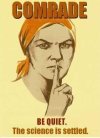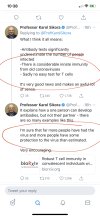I would hope the big takeaway is that a lot fewer people will get sick, and the virus will go away sooner.
But no way does this constitute actionable results that you would build your public policy response around. Yet. Hope and a single small data set is not a strategy.
They should keep digging and researching.
This is precisely what I was alluding to in my earlier post about academics shutting out dissenting voices.
“As the country awoke to an unprecedented economic lockdown in the middle of March, John Ioannidis, professor of epidemiology at Stanford University and one of the most cited physician scientists who practically invented “metaresearch”, questioned the lockdown and wondered if we might cause more harm than good in trying to control coronavirus. What would normally pass for skepticism in the midst of uncertainty of a novel virus became tinder in the social media outrage fire.
Ioannidis was likened to the discredited anti-vax doctor, Andrew Wakefield. His colleagues in epidemiology could barely contain their disgust, which ranged from visceral disappointment – the sort one feels when their gifted child has lost their way in college, to deep anger. He was accused of misunderstanding risk, misunderstanding statistics, and cherry picking data to prove his point.
The pushback was partly a testament to the stature of Ioannidis, whose skepticism could have weakened the resoluteness with which people complied with the lockdown. Some academics
defended him, or rather defended the need for a contrarian voice like his. The conservative media lauded him.
In this pandemic, where we have learnt as much about ourselves as we have about the virus, understanding the pushback to Ioannidis is critical to understanding how academic discourse shapes public’s perception of public policy.”
This is how the interview with Dr. Ioannidis ends:
“I welcome academic discourse and disagreement. I have no doubt that I know very little and that I make mistakes, but I am just trying to learn a bit more and to make fewer mistakes, if possible. I consider that people who criticize me with valid scientific arguments are my greatest benefactors. But the outrage propagated by social media is a force of its own, and destroys any intelligent discourse, civil or uncivil. Once the outrage gets going, platforms for academic discourse censor and the discourse just doesn’t happen. I was unable to publish my essay about nosocomial spread of COVID-19 in nursing homes and hospitals. I submitted to many outlets. I suspect the editors feared social media backlash against my raising an uncomfortable issue. Fear isn’t healthy for science.”

 www.biorxiv.org
www.biorxiv.org




